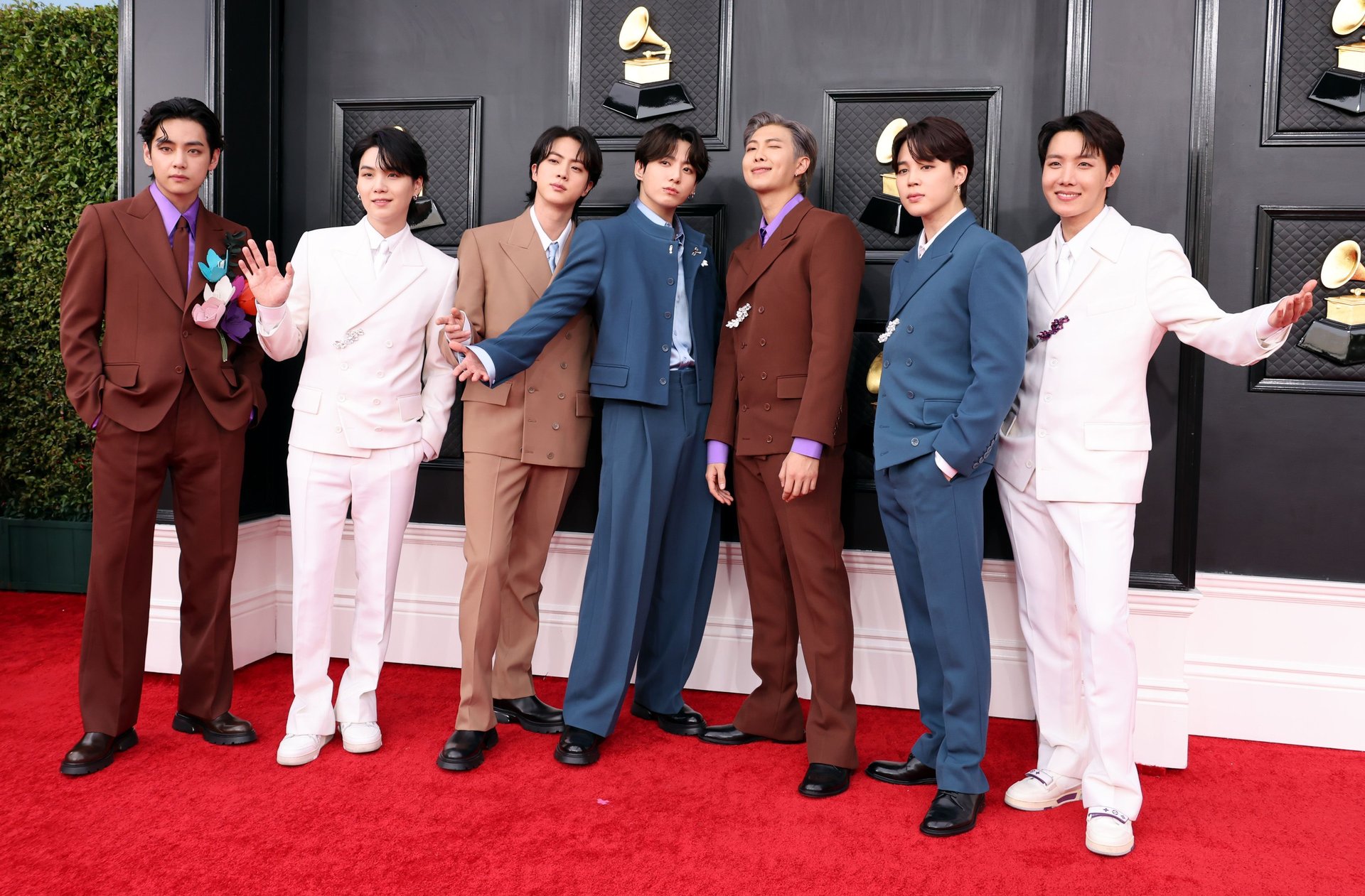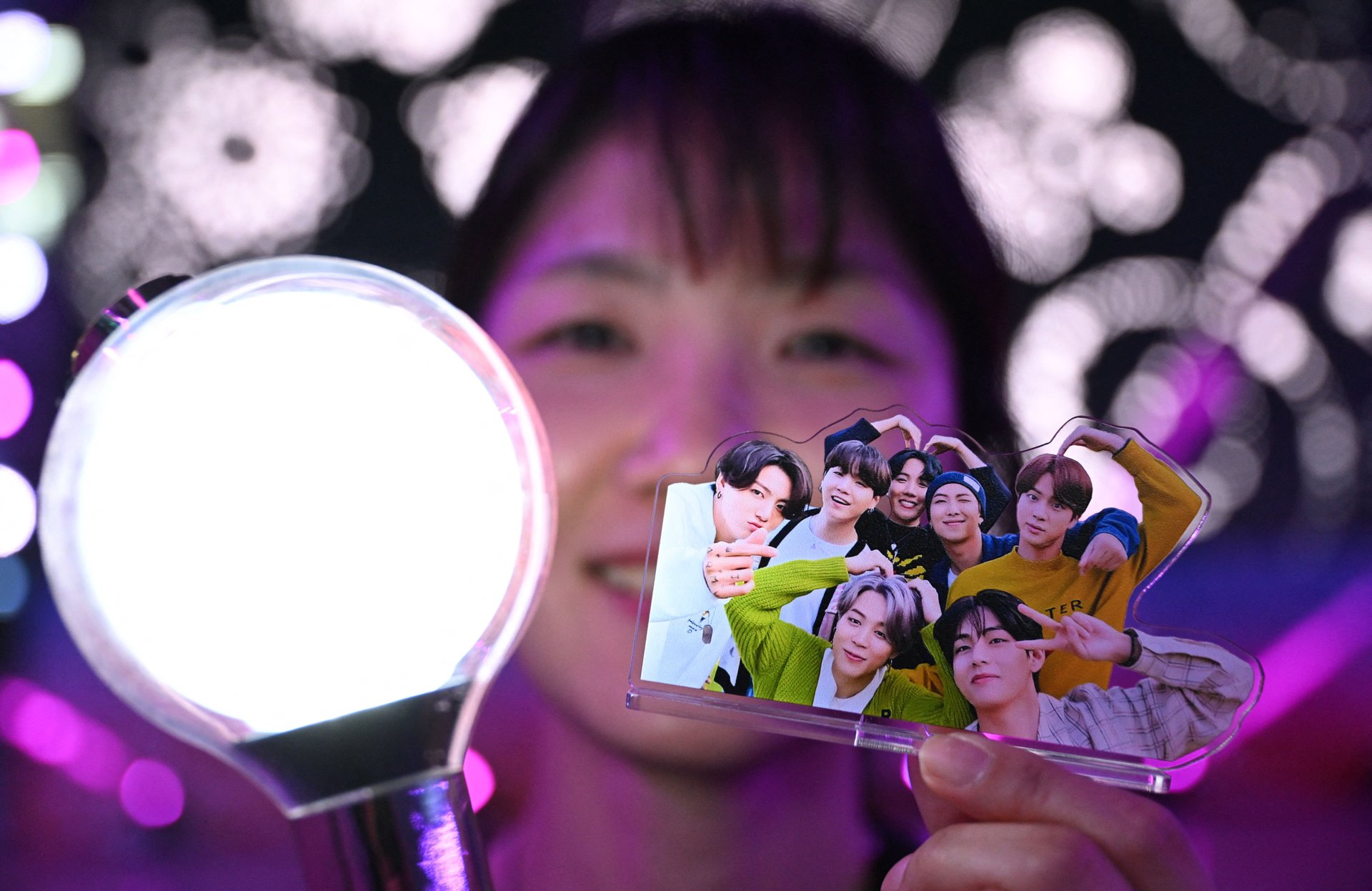Your next K-pop album might cost 25% more, thanks to Trump’s latest tariffs
The U.S. is slapping a 25% tariff on all South Korean goods — and for K-pop fans, that means pricier albums, photocards, and merch

Amy Sussman/Getty Images
The next time a K‑pop fan hits “buy” on a signed BTS album, they might not just find themselves paying for the photocard, the poster, or the exclusive preorder benefit — but for a 25% tariff, courtesy of U.S. trade policy. Beginning August 1, all South Korean imports to the U.S. will be hit with a blanket tariff just announced by President Donald Trump. While he advertised the policy as targeting steel and semiconductors, the K‑pop business — a $300 million-plus export engine powered by a global fandom — could take one of the more surprising hits.
That’s a problem for K‑pop, because it still lives and dies by physical album sales, and the timing could hardly be worse, given that BTS, the world’s most popular K-pop group, is just now reuniting after the seven members performed their mandatory military service.
Last year, South Korea exported nearly $292 million in physical K-pop albums alone, according to Korea Customs data. The U.S. accounted for a substantial portion of that, with American fans among the most voracious consumers of albums, tour merch, and collectibles. That doesn’t even include the mountain of lightsticks, hoodies, photo books, and limited-edition fan drops flooding into the U.S. from platforms such as Weverse (the HYBE-powered sales platform that’s essentially Amazon, Ticketmaster, and Reddit all rolled into one), Ktown4u, SM Global Shop, and Hello82.
Now, every single one of those goods is staring down a big price hike at the border.
K‑pop fans don’t just stream their favorite group’s music — they invest in it. They don’t just buy one version; they buy two or four (or maybe 10), and they coordinate bulk orders with friends. Album sales power Billboard charting, unlock fansign raffles, and keep smaller groups and labels financially viable.
And K-pop fans spend big. BTS’ most recent album, the 2022 anthology “Proof,” sold over two million physical copies worldwide on its first day of release and almost 425,000 copies total just in the U.S. Blackpink’s 2022 album, “Born Pink,” moved more than 400,000 physical copies in the U.S., making it the best-selling female K-pop album in U.S. history. Stray Kids, ATEEZ, Seventeen, and Twice have all hit No. 1 on the Billboard 200 album chart thanks largely to physicals. K-pop culture is one that merges community with consumption, and it’s one that doesn’t scale well with added costs.
Merch is the engine behind touring revenue. Every $80 Blackpink hoodie, $52 Stray Kids lightstick, and $110 Twice varsity jacket is part of a carefully calibrated global ecosystem. Disrupt that with a flat 25% tax and you’re not just inflating prices. You’re risking real attrition — and fans’ fury.
The tariffs risk dampening one of the most efficient, loyal, and globally mobilized fan bases in the music business. Labels face a lose-lose dilemma: Pass on the costs to fans and risk softening demand or absorb them and dent profit margins already squeezed by international logistics and marketing costs. “Tariffs on Korea starting August 1st apparently and I’m still waiting on one package to arrive… HURRRRRRYYYYYYY PLSSSS,” one fan posted on X, summing up the mood across what has been known as stan Twitter. “I don’t think I’m going to purchase K‑pop albums for the foreseeable future,” one fan tweeted. “It was already expensive to ship from Korea, but now… it’s going to be insane.” Another was already tallying the damage: “Albums and merch are already expensive,” they wrote. “Does [Trump] really want to piss off K‑pop stans?”

Jung Yeon-je/AFP via Getty Images
Sticker shock for stans
The timing, of course, couldn’t be worse, now that BTS is officially back. All seven members are reunited for the first time since 2022, and they confirmed during a livestream — watched in real time by over 7.3 million fans — that they’ll release an album in March 2026. (Because nothing in K‑pop is ever just a coincidence, the group’s fans, ARMY, are already convinced the drop date is March 6 because of a suspiciously frozen “3:06” clock in concept art.)
With the group — and others — readying comebacks, the buying cycle is about to kick into overdrive. But instead of prepping spreadsheets for group orders and bookmarking fan benefits, U.S. fans are now doing tariff math. A $75 Weverse Shop order could balloon to nearly $95 with the tariff — before shipping, which can already cost $30-60.
For big South Korean entertainment companies such as HYBE, SM, JYP, and YG, the immediate damage may be manageable. Stock in BTS’ parent company, HYBE, is still up around 40% year to date, driven by comebacks by the group (and others under HYBE's umbrella) and the company’s aggressive U.S. expansion — including domestic fulfillment operations that could blunt some of the tariff’s bite. But smaller and mid-tier groups rely heavily on international merch and album sales to fund tours, comebacks, and staff payroll. A 5-10% drop in U.S. revenue could mean scaled-down album packaging or tour delays.
Trump’s tariffs could inject volatility into an ecosystem that has so far been relatively insulated from global trade fights. And while it's true that most K‑pop companies have diversified into digital, virtual, and streaming-first strategies, physical albums remain a core revenue driver and branding pillar. Trump’s tariffs have no carveout for culture. They apply to all Korean imports — period. That will hurt indie, fan-favorite retailers, such as Choice Music LA and Hello82, which import Korean albums in bulk and distribute them quickly to U.S. fans.
K‑pop fandom is an ecosystem where consumers are also participants, where buying is an act of love, and where fan-run group orders are events in themselves. When the government intervenes in that space — even indirectly — it reshapes the emotional economy of the genre. K-pop is one of the few industries where U.S. imports are driven entirely by fans, not corporations. This isn’t Hyundai shipping cars, it’s a 17-year-old in Los Angeles buying a $134 NCT Dream collector’s pack because it includes a holographic Jeno photocard.
Comebacks with a catch
Online, the reaction to the tariffs has been as loud as a fan chant. There are memes comparing Trump’s policy with economic warfare, screenshots of overloaded carts hitting $187 pre-tariff, and a steady stream of protest disguised as stan humor.
K‑pop is one of South Korea’s most successful soft-power exports, a cultural force whose global fanbase has done more for the country’s image than most diplomatic envoys. BTS has been called a “strategic national asset,” and the group helped raise South Korean cultural exports to $13.6 billion in 2024. (In 2019, a report from the Hyundai Research Institute estimated that BTS brought in over $4.65 billion annually to South Korea’s economy — and the group has only gotten bigger internationally since.) Top K-pop idols are the faces of major fashion brands and frequently appear on the carpet of the Met Gala. And now, that entire self-sustaining, highly profitable, fan-powered pipeline is at risk.
Trump’s trade war wasn’t aimed at K‑pop, but it might be pricing some fans out of the experience entirely. If the tariff takes hold — and if labels can’t find a workaround — expect prices to spike, merch drops to slow, and fans to face the chilling effect of policy made continents away.
The U.S. hasn’t officially declared war on photocards, but if Trump’s latest round of tariffs go live on August 1 as planned, the newest BTS album or Twice deluxe edition might come with sticker shock. Sure, when BTS finally drops that album next spring, fans will show up. They always do. But if prices keep rising, shipping gets messier, and retailers pass on every cent of that 25% hike? Even the most loyal stan may have to choose: bias list — or grocery list.
